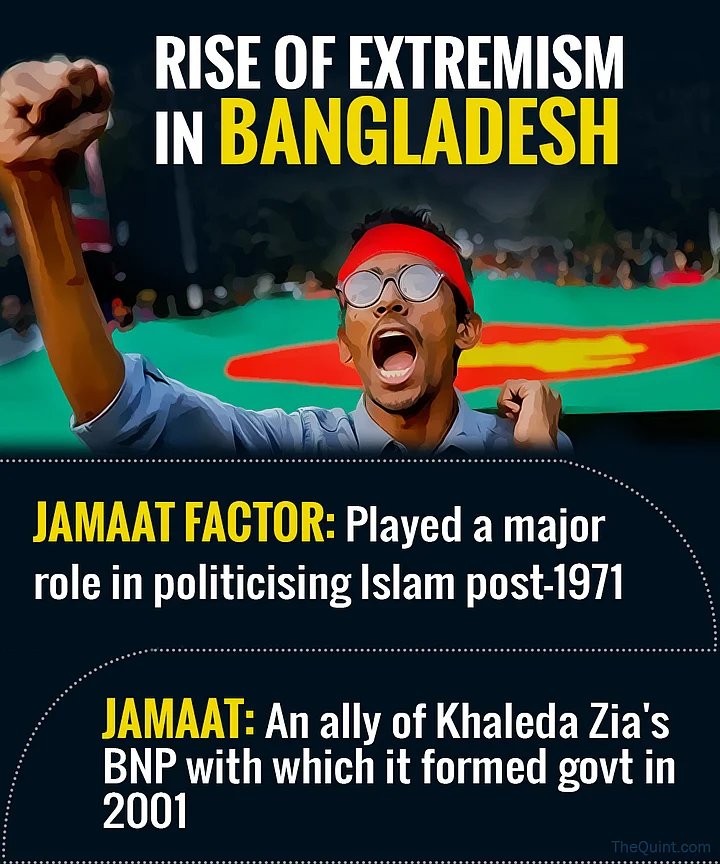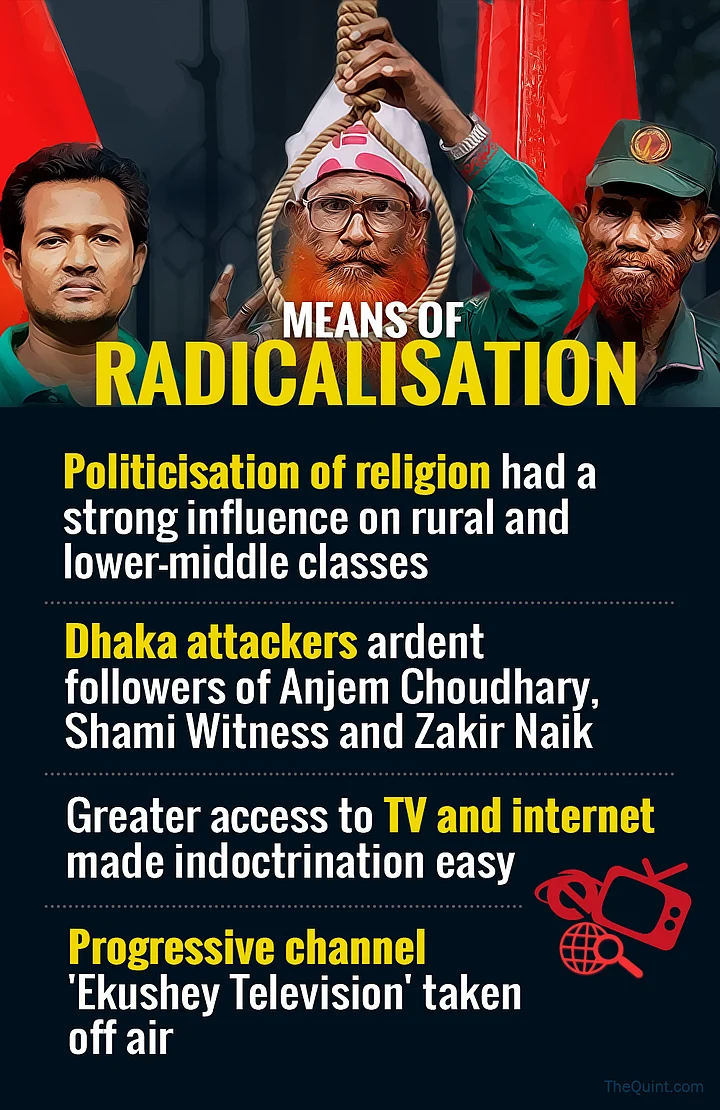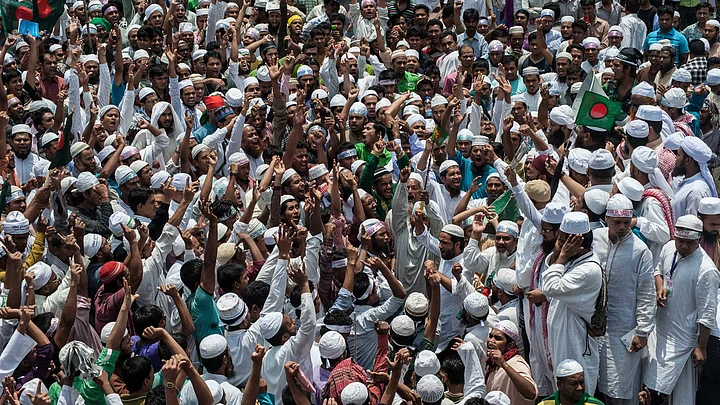The revelation that the ISIS-aligned Islamists who attacked a restaurant frequented by expatriates and members of Bangladesh’s elite class, in one of Dhaka’s richest neighbourhoods on 1 July, were drawn largely from the urban middle class has shocked and dismayed the nation. The government has vehemently denied the claims of allegiance to ISIS, insisting that they were home-grown terrorists affiliated to domestic outfits – the banned Jamaat-ul-Mujahideen (JMB) in this instance.
Assigning blame to an organisation that was nurtured by state patronage under the then coalition government of the Bangladesh Nationalist Party (BNP) and Jamaat-e-Islami (Jamaat) is beneficial to their opponents, the current Awami League government. JMB operated primarily in North-West Bangladesh, its members drawn from the rural, lower and lower-middle classes. This is in stark contrast to the identities of the July 1 attackers that have emerged from eyewitness accounts and footage, and ISIS’s own claims, supported by images.

Emergence of Conservative Islam
The decades of the politicisation of Islam in post-independence Bangladesh by BNP and Jamaat, their staunch ally whom they revived from the ranks of Pakistani agents during the Liberation War, has resulted in the proliferation of an increasingly conservative, intolerant and radical form of Islam throughout Bangladeshi society.
Political Islam became inseparable from the religion itself, determining how it is perceived and interpreted. This translated into the seeds of Islamism being planted amongst the rural, lower and lower-middle classes.
An educational system that did not function properly was supplemented by institutions that taught a conservative and fanatical brand of Islam, a foreign import from the Middle East, at odds with the pluralist Islamic traditions of a once secular nation. Additionally, the thriving migrant labour industry in Bangladesh drew on these classes.
Most of the people supplied by this industry went to the Middle East as well, returning home with the same poisonous religious dogma. Piety and fundamentalism became indistinguishable amongst the masses, whom politicians sought to control rather than enlighten.
.jpg?auto=format%2Ccompress&fmt=webp&width=720)
Radicalising People Through New Media
The juncture between the deeply stratified classes comprises mosques and preachers. Islam taught from the pulpit is almost unanimously etched with various degrees of conservatism. This has created a foundation of intolerance within society, which has been ignored by a country determined to paint itself as secular and inclusive.
The paths diverge again, with social mobility allowing people to have greater access to television and the internet. These, in turn, have been used to indoctrinate people into fanatical interpretations of Islam. Indeed, the Islamists involved in the 1 July attack were followers of the controversial proselytisers Anjem Choudhary, Shami Witness and Zakir Naik.

Low Literacy Rate and Fundamentalism
Literacy remains low in Bangladesh, making audio-visual means of dissemination the most effective way of spreading any message. Whenever there was a threat to the narrow view of the world engendered by the politics of Islam and its offspring Islamism, it was quickly extinguished. Ekushey Television, the country’s first private television channel that was distributed terrestrially alongside the state channel, BTV, was one such that brought progressive values to the entire country.
After two years of transmission, its threat was removed as it was taken off air by the BNP-Jamaat coalition in 2002. Awami League, too, has been compliant with this political landscape rather than challenging it and reviving secularism. A case in point is when it bowed to the pressure exerted by Hefazat-e-Islam, a network of fundamentalist clerics, and indefinitely postponed plans for much-needed reform in the education system.

Sinister Silence of Politicians
Both the madarsa system and the English medium system – the two ends of the educational spectrum – teach foreign syllabi and instil foreign values in an alien language. Students are dissociated and, in the absence of a functioning social framework that brings them back into the fold, they are vulnerable to drifting. The key differences between how the social classes receive similar information are language and medium.
Whether it is simplistic vitriol or pseudo-intellectual speeches, both are delivered with passion and conviction, and both repeat the line of Islam being at once the great equaliser and the greatest religion in the world, in whose service one must dedicate their life. As Bangladesh has welcomed this message because of its politicians, it has embraced intolerance, paving the way for extremism.
A ruling class, detached from the common man and his realities, has added to the frustration and alienation that simmer under the surface.
None of these distinct issues are being addressed by the politicians, be they from the ruling Awami League or its political opposition coalition of BNP and Jamaat. The effects of the potent cocktail that has been brewing across the classes are being felt. As both sides of the political divide indulge in opportunism and a blame game, extremism is escalating, undeterred and untreated. The class divide is prominent in Bangladesh, but it is transcended by Islamism. Debating who is more vulnerable is as futile as debating who is responsible if nothing is done to stem its flow. The July attack is a harbinger for worse to come unless this is rectified.
(The writer is a columnist for Dhaka Tribune whose socio-political writings include the short story collection, “Yours, Etcetera” and the poetry collection, “Requiem”. He can be reached at @ikhtisad)
Also read:
Dhaka Siege: Blow for Hasina Govt, Spells Trouble for the Region
Dhaka Requiem: From Stories of Liberation to a Dirge for the Dead
(At The Quint, we are answerable only to our audience. Play an active role in shaping our journalism by becoming a member. Because the truth is worth it.)
